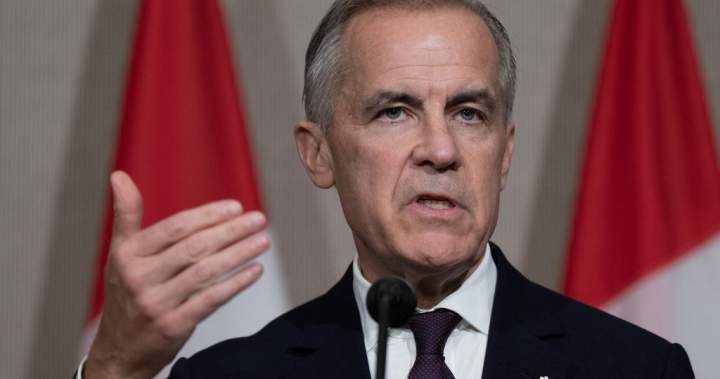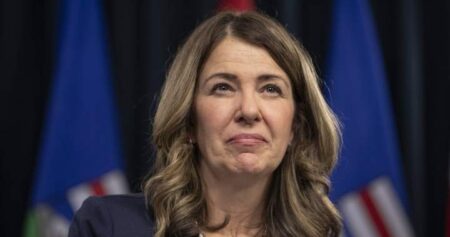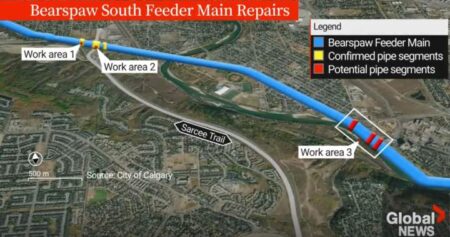As the federal government prepares to release a budget expected to see major new investments and spending along with a higher deficit, Canadians say they’re most concerned about measures to reduce their cost of living, according to a new poll.
The Ipsos poll conducted exclusively for Global News found 42 per cent of respondents want the budget, set to be tabled in Parliament on Tuesday, to prioritize helping with the increasing cost of everyday expenses.
That number far outpaces Prime Minister Mark Carney’s stated priorities for transforming the Canadian economy — including investing in the Canadian military and national defence (15 per cent), funding major projects and infrastructure (15 per cent), and even measures to mitigate the impact of U.S. tariffs (25 per cent).
At the same time, three out of five Canadians surveyed by Ipsos said the cost of living and inflation have gotten worse because the government is spending too much — right at a time where Carney has argued Canada needs to spend even more while talking about “sacrifices.”
“The prime minister may have the right answers on what needs to be done for the future of Canada, particularly in this very dire moment that we find ourselves in, but he has not rallied Canadians at this point — at least as we’re seeing in the data — to what those specific things are,” Ipsos Public Affairs CEO Darrell Bricker said in an interview.
“If it’s something that’s going to increase the challenge of getting by from day to day, it doesn’t really matter what you want to spend it on. Canadians are not keen on it.”
Indeed, the poll suggests 69 per cent of Canadians are “worried” that the government won’t do enough to help them in the years ahead. That number rose to more than 70 per cent among younger demographics.
In a speech last month to students at the University of Ottawa seen as a preview of his economic priorities in the upcoming budget, Carney outlined affordability measures like increased homebuilding, boosting trade apprenticeships and tax filing help for low-income Canadians.
But he mainly focused on efforts to rapidly expand domestic infrastructure and trade deals with international allies with the goal of doubling non-U.S. exports, in response to U.S. President Donald Trump’s tariffs, that he said will grow the economy and government revenues.

Get weekly money news
Get expert insights, Q&A on markets, housing, inflation, and personal finance information delivered to you every Saturday.
“We won’t transform our economy easily or in a few months,” he said in the speech. “It will take some sacrifices and it will take some time.”
The Ipsos poll found Canadians are still seized with the impact of years of high inflation, despite the inflation rate staying within the target range in recent months but rising slightly in September.
When presented with a list of what they blame for the cost of living increase, 62 per cent of respondents picked inflation, while 52 per cent said Trump’s tariffs and 36 per cent chose too much government spending.
“You can’t tell Canadians for the period of two years that inflation is the biggest economic problem, and then have them agree to all of a sudden turn on a dime and say it’s no longer a problem,” Bricker said.
“Inflation to Canadians is basically an alternate way of saying it’s tough to get by. So they’re not talking about what shows up in government reports.”
Canadians also expressed frustration with ongoing federal deficits in the poll, with 69 per cent saying it’s important to balance the budget and just 27 per cent expressing support for deficit spending as “common practice.”
The interim parliamentary budget officer and outside economists are predicting the deficit in Tuesday’s budget will blow past expectations set in the final months of the Trudeau government.
Ipsos did find that just over half of Canadians surveyed would support short-term deficit spending under the current economic situation, with even more saying additional spending would be justified on programs that help their day-to-day lives.
Those include support for more spending on health care (80 per cent) and new housing development (63 per cent), while issues like national defence and funding for more RCMP and border security officers saw less support.
While just over half of respondents said they would back deficit spending to ease the housing crisis, less than half said the same for funding major infrastructure projects.
“Canadians still have a lot of expectations of government (in terms of services) and the effect that they’re going to have on their cost of living, but they also expect a government that’s going to operate within its means,” Bricker said.
“The argument the government will make is that they’re making investments because of the challenges that we’re facing in the country today, and therefore Canadians need to sacrifice by allowing a larger deficit … but right now, Canadians are saying, ‘I don’t see it.’”
Many of the responses to the poll echo the criticisms leveled by opposition parties that have signalled they may not support the budget in Parliament.
A vote rejecting the budget could trigger an election just over six months after Canadians elected Carney’s Liberals.
Bricker said he’s doubtful an election will be triggered this year, suggesting it’s not in any party’s best interest. Yet he also sees warning signs for the government in the poll results.
“I think that there’s an assumption in the government that everybody’s behind them on (their economic agenda), and you don’t really see that,” he said.
These are some of the findings of an Ipsos poll conducted between October 25 and 27, 2025, on behalf of Global News. For this survey, a sample of 1,000 Canadians aged 18+ was interviewed online. Quotas and weighting were employed to ensure that the sample’s composition reflects that of the Canadian population according to census parameters. The precision of Ipsos online polls is measured using a credibility interval. In this case, the poll is accurate to within ± 3.8 percentage points, 19 times out of 20, had all Canadians aged 18+ been polled. The credibility interval will be wider among subsets of the population. All sample surveys and polls may be subject to other sources of error, including, but not limited to coverage error, and measurement error.
© 2025 Global News, a division of Corus Entertainment Inc.
Read the full article here














